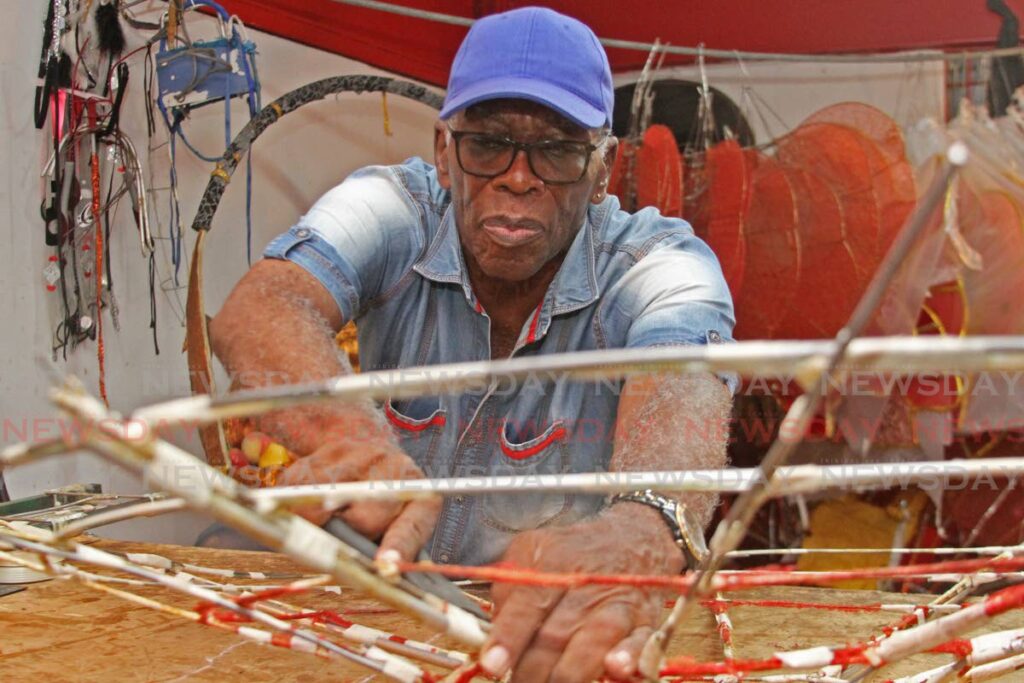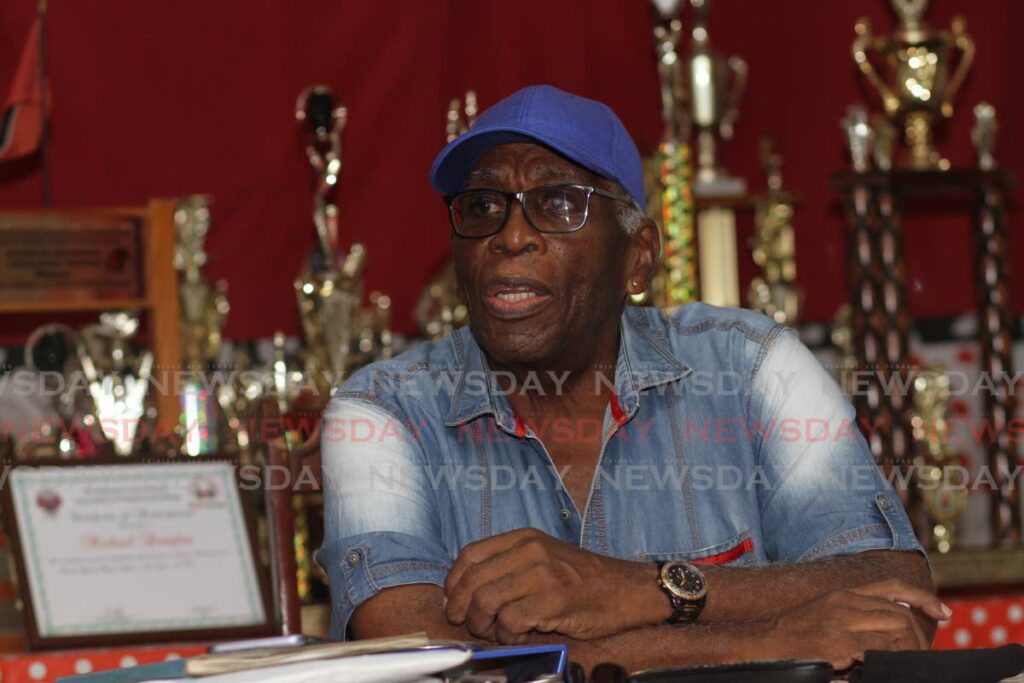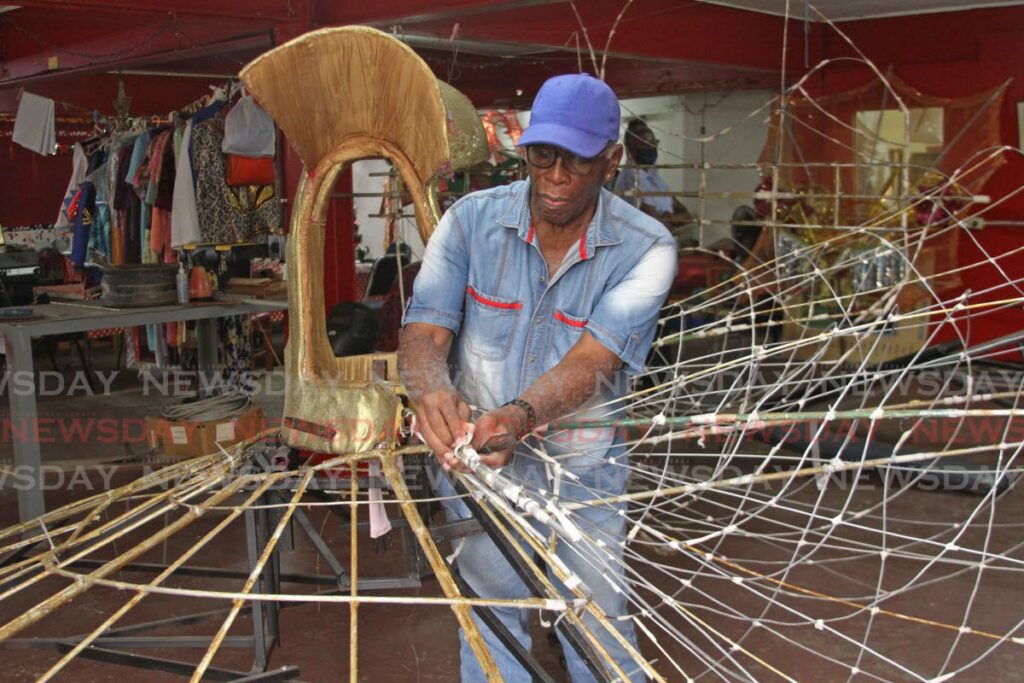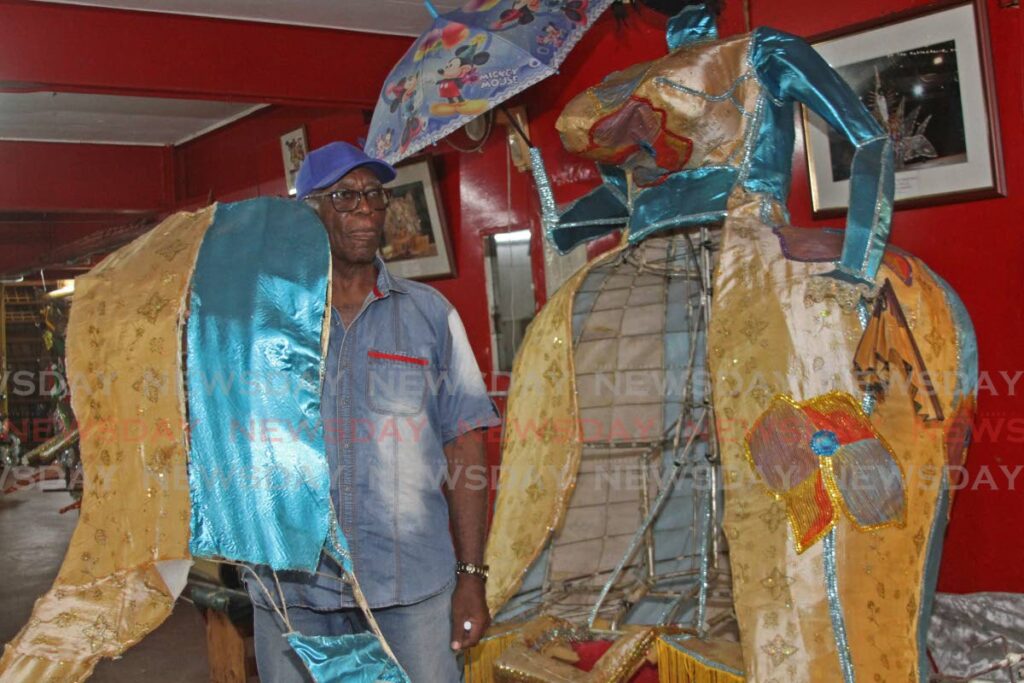Wirebender Michael Douglas, 66 years of making mas

Wirebender Michael Douglas has avidly participated in Carnival since 1956, when he was just ten years old. Now 76, he keeps a logbook documenting the mas he’s played over the past 66 years.
But in recent years, Douglas has feared TT is on the brink of cultural erasure with the modernisation of mas-making.
For this reason, he has been advocating for greater stakeholder collaboration to ensure that traditional mas-making and cultural practices are preserved.
He told Sunday Newsday, “It have to be a collaboration between the government and the people.
“You have the people who have the skills, but who running the country? Who in charge of tourism?
"They supposed to be able to come together with the people who have the art. You have to let some situation arise where we could come together and push it (the culture), so that people who come in the country could go to a place like a museum and see our mas.”
Leader of the San Fernando-based small mas band Pan Mas Traditions Fancy Sailors, Douglas doesn’t like discarding costumes and keeps some of his most prized ones – a six-foot-tall dame Lorraine, a car-shaped headpiece and a horse – on display at his Cipero Street mas camp.
He wants to create a museum and is searching for donors to make the dream a reality.
For Douglas, Carnival and the creative people associated with the festivities have come too long a way, and fought too hard for it not to be duly recognised and their work properly preserved.
Douglas complained, “TT’s system has a tendency to discard our history, especially our traditional history, which is our creative history. Some of the people to blame for that is the media and radio stations.

“As a youthman growing up in the ‘50s, I remembered going to school at age ten-11. I used to have to be running home on an evening to listen to a programme called Rollin' Home for 30 mins and in that 30 minutes you listening to calypso.
“But hear what happens: up come Lent and for 40 days, our culture was buried. For 40 days we couldn't hear our own calypso, but you hearing every other music…it was so for a very long time.”
It’s why even there was no Carnival in 2021, and only a “Taste of Carnival” this year – owing to the covid19 pandemic – Douglas is doing his best to keep the Carnival spirit alive.
Accustomed to living in his mas camp in the weeks leading up to Carnival, Douglas and his partner Janice Linda Richards – who is also an member of the band – spent Carnival Monday and Tuesday in 2021 at the mas camp.
While this year’s Taste of Carnival wasn’t the whole meal, it was enough to satisfy Douglas’s appetite.
“Once we not out on the road with the DJs and steelband, that’s 99 per cent of the mas missing.
“But I personally support (it), because I am a culture person. The Carnival people – the costume-makers, the steelband men, the arrangers, the calypsonians, the soca singers – need a platform to play, because this is what we do, this is our job, this is how some people make money."
Predicting Carnival 2023 will be grander and more reflective of traditional celebrations, Douglas has already started planning his presentation.

After all, his band – which was created in 2004 – is a nine-time small band of the year winner (2007, 2009-14, 2016, and 2018) at the annual San Fernando parade of the bands.
Hoping to take band of the year in 2023, Douglas teased that next year’s presentation will be an ode to culture, fashion and technology of the roaring 20s.
Inspired by what he says are parallels between the decades, Douglas thinks the 2020s have thus far been an “advanced 1920s.”
“We decide to use this covid in our favour by taking a rest and taking our time to rebuild certain aspects of the band.
“We want to do something from in the roaring 20s which was the time of heavy gangsterism in the US, fashion and those things they used, like antique lamps, telephones and cars. We also want to represent the dancehalls of those periods.
“I have already started to actually build a queen costume for 2023, I have also started the king...Usually there is ten individual (costumes) on the road. I have started to do research for those too. As we go along through the year, we’ll take our time and go through all the wireworks, so later on we can start to cover and decorate.”
It’s why Douglas views Taste of Carnival as symbolic and hearkened to the creation of Carnival. Observing the traditional mas parade held on February 20 at Queen's Park Savannah, in a safe zone, he noted it was symbolic of the role as it was the only parade of its kind this year. He expects it would be followed by the more modern mas next year, given his prediction of a return of Carnival street parades.
He laughed, “We start it way back then and we start it now, so it’s symbolic.”
Douglas wants his legacy, and his band’s, to be one of continuity.

For several years, he’s taught a wire-bending and traditional mas class to students at Mon Repos RC School. He’s also helped the school with its annual junior parade of the bands presentation for San Fernando’s kiddies' Carnival celebrations.
He knows despite his enthusiasm and efforts, it will be up to TT’s younger generation to pick up the baton and do the work to ensure the culture lives on.
“Plenty more could be done to preserve our culture, but modernisation is something else, because you have plastic moulding and machines.
“Long time, if a man wanted to play a dragon mas, he would bend it out of wire or make it out of papier-mache.
“Now a man could say he want to do something like that and he’ll go to the man with the machinery and they’ll make a moulding out of plastic.
“I don’t think it have as much skilled wireman as it had back in the day, But I definitely think the wirework should be here to stay because it’s a skill.”
When Douglas creates his costumes, he doesn’t sketch them, but rather gets the idea and builds it along the way from his mind. Depending on the size of the costume it can take anywhere from a few days to months to build.
“For me, half the time I don’t even know how I coming to create a costume. I would say I’m going to the mas camp to bend something and I may be saying the same thing for days without doing nothing.
“And just so a day, or an evening, I just get the urge, pick up my pliers and start work. Sometimes for the day I might just only straighten one piece of wire. But then as the time go along, I does start to speed up. But I love the process too bad, because it’s very creative, it’s real creative.”
He wants young people to know that wire-bending and mas-making, like everything in life, takes time. But with practice, effort and support, they’ll get where they need to be.
“The first time I try a thing with wire-bending, the costume fall down. I try again and it fall down...but I kept going until I got it right.”
He is also calling on businesses to invest in programmes like teaching wire-bending and not only giving sponsorship to large bands, given small and medium bands often need it the most.
For Douglas, his Carnival journey has been fulfilling.
He happily recalled, “I started off playing military mas, because in those days, you had a lot of military mas. At the age of ten, in 1956, that was the first year I hit the road. I played in those bands in ’56, ’57 and in ’58 I started to play (Fancy) Indian mas with a gentleman by the name of Hendrickson.”
Now, Douglas proudly proclaims he’s “played in every band in San Fernando from military to Fancy Sailor to Indian…the whole works.”

Comments
"Wirebender Michael Douglas, 66 years of making mas"